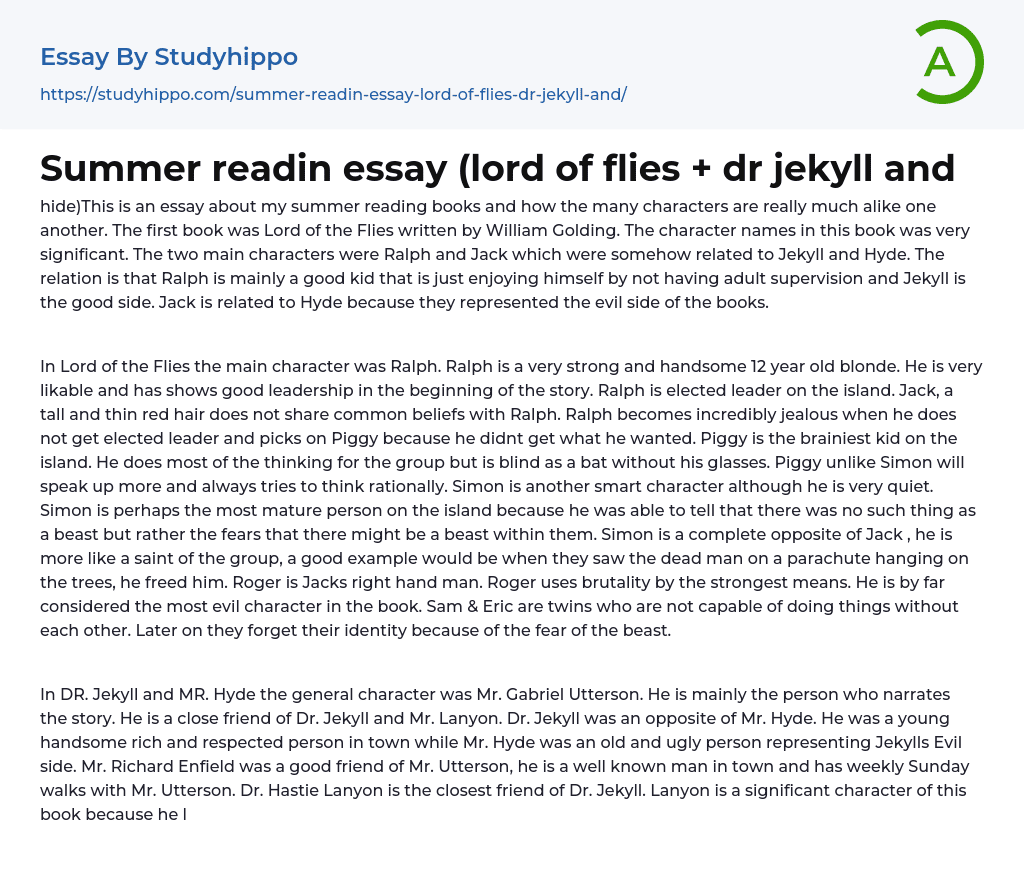This essay focuses on my summer reading books and the striking similarities among the numerous characters within them. The initial book, Lord of the Flies, penned by William Golding, particularly emphasized the importance of character names. Ralph and Jack were the two primary characters, both bearing resemblance to Jekyll and Hyde. Ralph epitomizes the good-natured child relishing in the freedom of lacking adult supervision, akin to Jekyll's virtuous side. Conversely, Jack embodies the malevolent forces within the story, much like Hyde does in Stevenson's novel.
The protagonist in Lord of the Flies is Ralph, a 12-year-old blond boy who possesses strength and good looks. Initially, he displays strong leadership skills and gains election as the island's leader. However, Jack, a tall and thin redhead with contrasting beliefs to Ralph's, creates conflict. Ralph becomes envio
...us and bullies Piggy due to his own unfulfilled desires. Piggy, recognized as the most intelligent child on the island, assumes much of the group's thinking but heavily relies on his glasses since he is visually impaired without them.
On the contrary, Simon is quiet yet astute and comprehends that there exists no actual beast but only their individual fears. He acts as a saintly figure by liberating a deceased man suspended from a parachute in the trees—a direct opposition to Jack's nature. Roger serves as Jack's assistant and resorts to brutality in order to enforce his ideas, making him one of the book's most malevolent characters.
Sam & Eric are inseparable twins who depend on each other entirely; however, their apprehension towards the beast leads them to lose their personal identities.
In the story DR. Jekyll and MR. Hyde, Mr. Gabriel Utterson serves as th
main narrator and fulfills a general character role. He is a close friend of both Dr. Jekyll and Mr. Lanyon.
Dr. Jekyll possesses youth, good looks, wealth, and respectable standing within the town community in contrast to Mr. Hyde who represents his sinister side and is depicted as an elderly and unattractive figure.
Mr. Richard Enfield enjoys a prominent reputation in town and shares a strong friendship with Mr. Utterson; they frequently go on Sunday strolls together.
Dr. Hastie Lanyon holds the closest bond with Dr.Jekyll among all individuals; later on in the narrative, he becomes significant when he unveils Jekyll's dual identity.
Poole takes charge of housekeeping duties as Dr.Jekyll's primary servant; his loyalty is demonstrated through his long tenure serving Jekyll.
Bradshaw serves as the guardian for securing access to the lab through its rear entrance.
Mr.Guest works as Mr.Utterson's secretary; he makes a discovery about similarities between Dr.Jekyll and Mr.Hyde's handwriting.
Sir Danvers Carew, an esteemed member of parliament, falls victim to Mr.Hyde's murderous acts later in the story.
The Lord of the Flies is set on an unnamed Pacific island, described as boat-shaped with a jungle and orchard leading to mountains. Simon and Ralph find the conch on the beach to gather the boys. Nearby, there is an orchard where they find food. The jungle serves as Jack's hunting ground for pigs and is believed to house the beast. The mountain becomes important when Jack, Ralph, and Simon climb it to start a fire signal. Eventually, Jack establishes his headquarters in a castle-like structure where Piggy meets his end. In contrast, London is the setting for Jekyll and Hyde but only one peculiar door holds significance. However, its environment
greatly impacts the stranded boys in Lord of the Flies. Initially carefree upon arrival without adults, Ralph matures and learns survival skills on the island while Jack quickly adapts with bravery and hunting prowess. The natural surroundings offer freedom while teaching wilderness survival skills. Both novels exhibit a subtle connection between good and evil within their respective environments - whether through Dr.Jekyll's transformation or how individuals are shaped by experiences in Lord of The Flies' isolated setting.Ralph represents goodness while Jack embodies evil in The Lord of the Flies.
In contrast, Dr. Jekyll is depicted as virtuous while Mr. Hyde is portrayed as wicked in the story of Dr. Jekyll and Mr. Hyde. Nonetheless, it should be noted that all characters experience a change in The Lord of the Flies due to their environment, whereas in Dr. Jekyll and Mr. Hyde, it is those around Dr. Jekyll who influence him to take the potion.
Category: English
- Book Summary essays
- Metaphor essays
- Reader essays
- Rhyme essays
- Literary devices essays
- Villain essays
- Books essays
- Genre essays
- Literary Criticism essays
- Writer essays
- Protagonist essays
- Simile essays
- Poem essays
- Book Report essays
- Book Review essays
- Greek Mythology essays
- Plot essays
- Tragic Hero essays
- Coming of Age essays
- Play essays
- Rhetoric essays
- Rhetorical Question essays
- Translation essays
- Understanding essays
- Reason essays
- Character essays
- Letter essays
- American Literature essays
- Literature Review essays
- Utopia essays
- Poetry Analysis essays
- Dante's Inferno essays
- Between The World and Me essays
- Incidents in The Life of a Slave Girl essays
- Flowers for Algernon essays
- Myth essays
- Everyday Use essays
- Boo Radley essays
- Genesis essays
- Richard iii essays
- Alice in Wonderland essays
- On the road essays
- Ozymandias essays
- The Nightingale essays
- Holden Caulfield essays
- Animal Farm essays
- 1984 essays
- A Hanging essays
- Shooting An Elephant essays
- A Tale Of Two Cities essays




